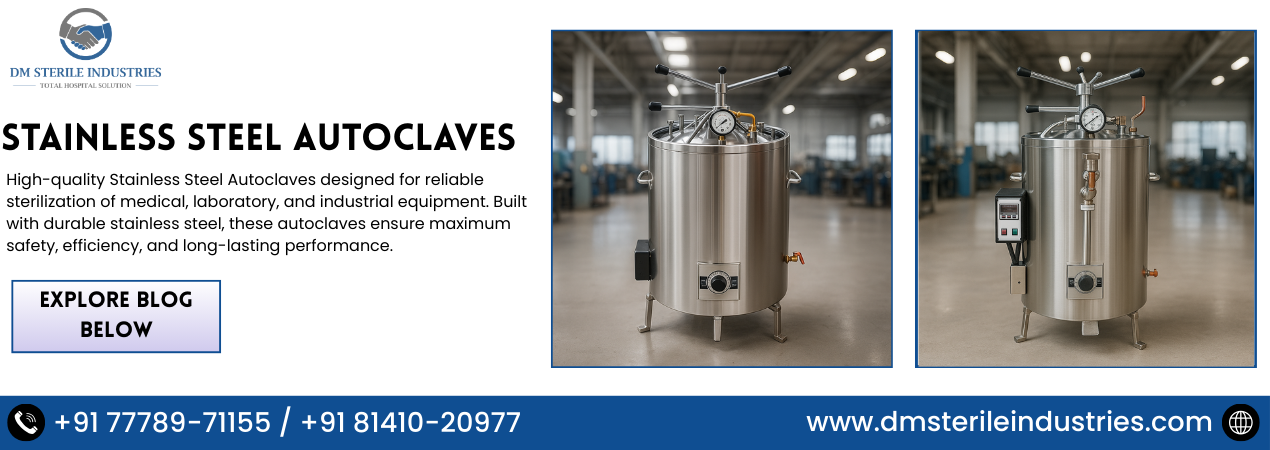Introduction to Laboratory Autoclave Sterilizer
A Laboratory Autoclave Sterilizer is an essential device designed for sterilizing laboratory instruments, culture media, and medical waste using high-pressure saturated steam. It is widely used in research labs, hospitals, pharmaceutical companies, and universities for ensuring contamination-free operations. By achieving precise temperature and pressure conditions, autoclaves guarantee the complete destruction of bacteria, fungi, viruses, and spores. These sterilizers provide safe, efficient, and reliable sterilization cycles, making them indispensable for microbiology, biotechnology, and chemical laboratories across India and worldwide.
Working Principle and Process Flow
The Laboratory Autoclave Sterilizer works on the principle of moist heat sterilization, where high-pressure saturated steam at temperatures ranging between 121°C and 134°C penetrates instruments and materials to destroy all forms of microbial life. The process typically involves loading items, sealing the chamber, steam generation, sterilization holding time, and controlled depressurization. This ensures effective sterilization while maintaining the integrity of sensitive laboratory equipment and glassware. With advanced control systems, modern autoclaves provide precise monitoring and safe operation.
Types of Laboratory Autoclave Sterilizers
- Vertical Autoclaves – Compact units suitable for microbiology and research labs.
- Horizontal Autoclaves – Large capacity models designed for hospitals and pharmaceutical industries.
- Portable Autoclaves – Lightweight, smaller versions for quick sterilization needs.
- Double Door Autoclaves – Designed for cleanroom applications ensuring contamination control.
- High-Pressure Autoclaves – Advanced systems for industrial and heavy-duty sterilization requirements.
Key Features and Specifications
- Temperature Range: 121°C to 134°C for effective sterilization cycles.
- Stainless Steel Chamber for durability and long service life.
- Automatic Pressure & Temperature Controls for user safety.
- Built-in Safety Valves and Digital Displays for accurate monitoring.
Applications of Laboratory Autoclave Sterilizer
- Used in microbiology labs to sterilize glassware, media, and culture instruments.
- Hospitals and diagnostic centers utilize autoclaves for surgical tools and biomedical waste.
- Pharmaceutical companies rely on autoclaves for sterilizing production equipment and raw materials.
- Research institutes use autoclaves to maintain aseptic laboratory conditions.
Benefits of Laboratory Autoclave Sterilizer
- Ensures complete elimination of microorganisms, guaranteeing contamination-free experiments.
- Automated control systems improve user safety and sterilization accuracy.
- Durable stainless steel construction ensures long-term usage and low maintenance.
- Eco-friendly sterilization without harmful chemicals, safe for laboratory environments.
Manufacturers & Suppliers in India
Leading Indian manufacturers like DM Sterile Industries, Medica Instruments, and Ace Scientific supply high-quality Laboratory Autoclave Sterilizers. These companies are trusted for their precision-engineered sterilization systems, catering to hospitals, research laboratories, and pharmaceutical industries across the nation and globally.
Maintenance and Safety Tips
- Regularly clean the autoclave chamber and trays after every cycle.
- Check safety valves and gaskets to prevent leaks and pressure loss.
- Use distilled water to avoid scale formation inside the chamber.
- Schedule preventive maintenance and calibration periodically.
- Ensure proper loading to allow steam penetration for effective sterilization.
FAQs – Laboratory Autoclave Sterilizer
Contact Details
Talk to our specialists today for tailored solutions and fast assistance.

